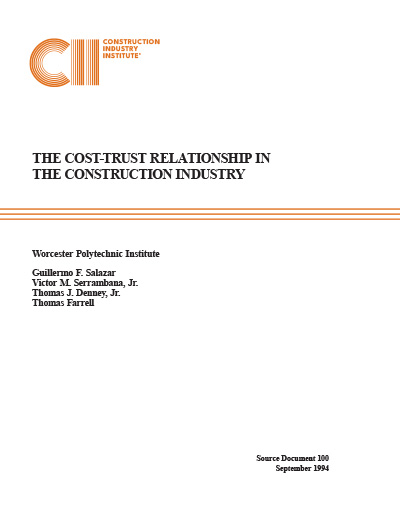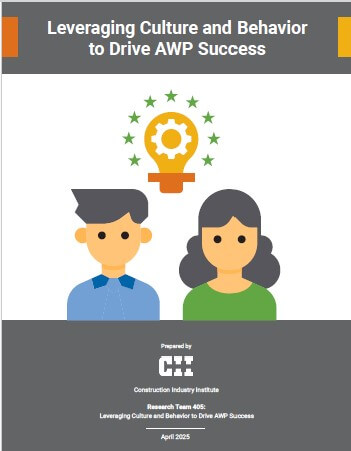
The Cost-Trust Relationship in the Construction Industry
Trust is believed to be a factor in reducing project costs, while a lack of trust in business relationships is thought to be related to inefficiencies and increased project costs. Based on research data form 262 projects, the intuitive notion that mutual trust and project cost are correlated is now statistically supported.
In the construction industry, it is important to foster cooperation among parties. Concepts such as partnering, team-building, cooperative alliances, and alternate dispute resolution are actively promoted by the Construction Industry Institute. These concepts are becoming increasingly embraced to increase the level of cooperation between project participants.
One of the basic elements of a cooperative relationship is mutual trust. Trust is a salient factor in determining the effectiveness of many relationships. It facilitates interpersonal acceptance and openness of expression. A trusting relationship between the parties is based on a mutual understanding of each other’s capabilities and limitations. It is also based on the personal and corporate integrity of both parties. Trust is a basic ingredient in effective team-building, timely decision-making, and in building long-term relationships.
The CII Contracting Phase II Task Force has conducted research on the relationship between the trust between the parties and the project cost. The task force defines trust as: “the confidence and reliance one party has in the professional competence and integrity of the other party to successfully execute a project in the spirit of open communication and fairness.”
The research identified a list of trust indicators that represent areas of activity in the contracting process where a trusting behavior between the parties can be observed and is important in achieving project objectives. Implemented in a computer program, the research allowed the task force to examine different aspects of trust and the corresponding cost impact on the project.
The research identifies those aspects of the relationship between the parties that provide the greatest project cost savings. Those having the highest cost impact primarily relate to open and honest communications, the professional competence and integrity of the parties, and the willingness to adapt and implement changes for the betterment of the project.
The following are areas of activity in the contracting process where trust-related issues have a significant impact on project cost: open discussions of alternative methods of performing the work, value engineering, constructability, contract administration, risk allocation, level at which disputes related to risk allocation are solved, communications, and dispute resolution.
The following cost-related factors are significantly affected by the level of trust: project team efficiency, timing of decisions, project schedule, project performance and quality, timing of approvals, amount of rework, administrative costs, field supervision, and completeness of project scope.
The findings from this research confirm that mutual trust is essential in promoting cooperative relationships, effective project teamwork, and early project involvement which in turn influence the successful attainment of openly communicated project objectives. It is expected that the product of this research will provide contracting parties with a tool to aid them in establishing a level of mutual trust in their projects conducive to an optimum potential for cost effectiveness. This approach could bring a “step change” in the reduction of project cost while maintaining project quality.
The following project characteristics are important in determining the level of trust between parties:
- Involvement in project scoping
- Involvement in project design
- Familiarity between the parties
- Attainment of the most important project objective, and type of contract.
(SD-100, p. 5)
The following are areas of activity in the contracting process where trust-related issues have a significant impact on project cost:
- Open discussions of alternative methods of performing the work
- Value engineering
- Constructability
- Contract administration
- Risk allocation
- Level at which disputes related to risk allocation are solved
- Communications, and dispute resolution
The following is a sampling of specific actions related to the level of trust have been identified as having the highest potential impact on project cost. Refer to SD-100 for a complete listing.
- Adopt a mission statement committing both parties to an open and fair approach to contract administration.
- Emphasize the intent rather than the letter of the contract.
- Share project objectives with all parties during the scoping and planning stages of a project.
- Explore alternative methods of performing the work related to project scope, standards, procedures, specifications, and sequence.
- Openly discuss merits of alternative methods and adopt those that best suit the project objectives.



